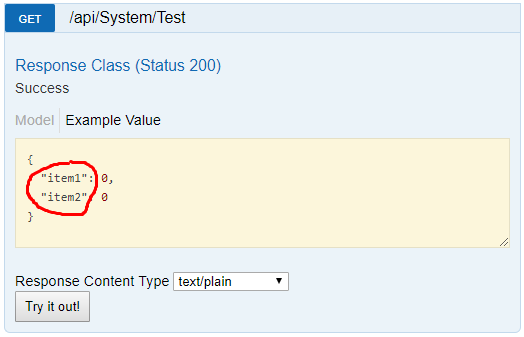For serializing response just use any custom attribute on action and custom contract resolver (this is only solution, unfortunately, but I'm still looking for any more elegance one).
Attribute:
public class ReturnValueTupleAttribute : ActionFilterAttribute
{
public override void OnActionExecuted(HttpActionExecutedContext actionExecutedContext)
{
var content = actionExecutedContext?.Response?.Content as ObjectContent;
if (!(content?.Formatter is JsonMediaTypeFormatter))
{
return;
}
var names = actionExecutedContext
.ActionContext
.ControllerContext
.ControllerDescriptor
.ControllerType
.GetMethod(actionExecutedContext.ActionContext.ActionDescriptor.ActionName)
?.ReturnParameter
?.GetCustomAttribute<TupleElementNamesAttribute>()
?.TransformNames;
var formatter = new JsonMediaTypeFormatter
{
SerializerSettings =
{
ContractResolver = new ValueTuplesContractResolver(names),
},
};
actionExecutedContext.Response.Content = new ObjectContent(content.ObjectType, content.Value, formatter);
}
}
ContractResolver:
public class ValueTuplesContractResolver : CamelCasePropertyNamesContractResolver
{
private IList<string> _names;
public ValueTuplesContractResolver(IList<string> names)
{
_names = names;
}
protected override IList<JsonProperty> CreateProperties(Type type, MemberSerialization memberSerialization)
{
var properties = base.CreateProperties(type, memberSerialization);
if (type.Name.Contains(nameof(ValueTuple)))
{
for (var i = 0; i < properties.Count; i++)
{
properties[i].PropertyName = _names[i];
}
_names = _names.Skip(properties.Count).ToList();
}
return properties;
}
}
Usage:
[ReturnValueTuple]
[HttpGet]
[Route("types")]
public IEnumerable<(int id, string name)> GetDocumentTypes()
{
return ServiceContainer.Db
.DocumentTypes
.AsEnumerable()
.Select(dt => (dt.Id, dt.Name));
}
This one returns next JSON:
[
{
"id":0,
"name":"Other"
},
{
"id":1,
"name":"Shipping Document"
}
]
Here the solution for Swagger UI:
public class SwaggerValueTupleFilter : IOperationFilter
{
public void Apply(Operation operation, SchemaRegistry schemaRegistry, ApiDescription apiDescription)
{
var action = apiDescription.ActionDescriptor;
var controller = action.ControllerDescriptor.ControllerType;
var method = controller.GetMethod(action.ActionName);
var names = method?.ReturnParameter?.GetCustomAttribute<TupleElementNamesAttribute>()?.TransformNames;
if (names == null)
{
return;
}
var responseType = apiDescription.ResponseDescription.DeclaredType;
FieldInfo[] tupleFields;
var props = new Dictionary<string, string>();
var isEnumer = responseType.GetInterface(nameof(IEnumerable)) != null;
if (isEnumer)
{
tupleFields = responseType
.GetGenericArguments()[0]
.GetFields();
}
else
{
tupleFields = responseType.GetFields();
}
for (var i = 0; i < tupleFields.Length; i++)
{
props.Add(names[i], tupleFields[i].FieldType.GetFriendlyName());
}
object result;
if (isEnumer)
{
result = new List<Dictionary<string, string>>
{
props,
};
}
else
{
result = props;
}
operation.responses.Clear();
operation.responses.Add("200", new Response
{
description = "OK",
schema = new Schema
{
example = result,
},
});
}


return new { speed = 5.0, distance = 4 };for example? – FireProducesResponseTypeattribute to explicitly expose what I am returning? – PsychognosisProducesResponseTypeAttributeis an ASP.Core attribute from the namespaceMicrosoft.AspNetCore.Mvc. Yes, it is used for documentation and ApiExplorers including Swashbuckle use it. Withdynamicmy documentation is less specific hence my experimentation with named tuples and my question around how to use them properly. – PsychognosisMyType. – ChiselProducesResponseTypeat all if you have one return type. However I'm also looking a way to turn named tuple to JSON with legible property names. – Fully